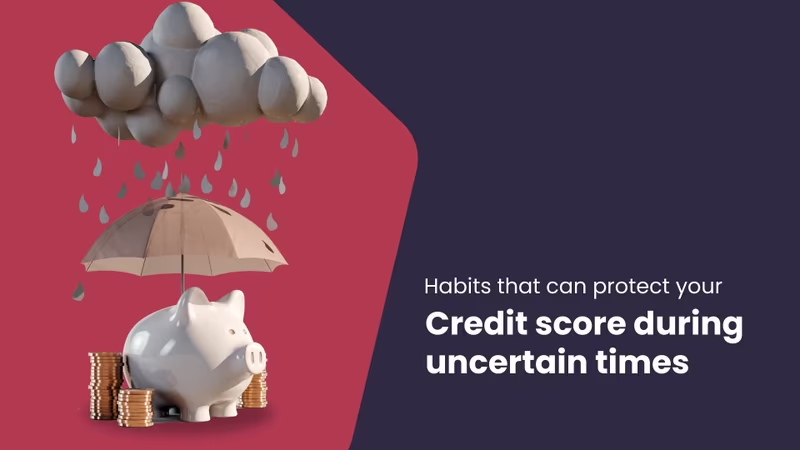As the COVID-19 pandemic almost shut down the global economy and salaries were cut down in half, Unnikrishnan, a Kerala native working at a start-up in Bengaluru, was forced to cut his non-essential expenses. By doing so, he protected his credit score.
He also automated his essential recurring bills so that he doesn't forget about them amid the ongoing stress. Thankfully, he was smart enough to keep some money in a separate account for emergency purposes. So, the salary cut didn't affect him too severely.
Have you noticed a few smart decisions Unnikrishnan made during those uncertain times?
- He filtered out his unnecessary expenses.
- He had an emergency fund.
- He automated all his recurring bills and payments.
- He spent his money very thoughtfully.
What did we learn from Unnikrishnan's story here? We learned that uncertain times are real. You may lose your job, the market may crash, or even a pandemic may hit the world.
So, it's extremely important for everyone to adopt a few financial habits so that you can stay afloat without much damage and keep your credit score in healthy shape so that you can reap its benefit in time of need.
But remember, these are not so easy. Any activity takes a considerable time to become a habit. So, gear up, and let's learn more about these financial habits that can protect your credit score and finances during uncertain times.
1. Always Pay Your Credit Card Bills and Monthly Loan Installments On Time
Having a credit card is not enough to build up your credit score. You must use it and use it wisely to boost your credit score fast. The number 1 thumb rule to ensure a stellar credit score is paying all your bills on time.
A good credit history works like a boon when applying for a loan during hard times. You have a better chance of getting your application approved and avail lower interest rates and longer duration if the money lender sees your good credit habits. So, consider automating your bills and ensure they don't bounce.
2. Budget Monthly Expenses
The first step to start building good money habits is to get on a budget. When you have a set budget for every month, you become mindful of expenses.
So, pay your bills every month on time, pay premiums before the due date and ensure you do not miss them, set aside money for your cash savings as soon as you get your salary, and be vigilant about avoiding impulse shopping. If you make these rules your habit, you will find it much easier to manage your finances.
3. Save More, Spend Mindfully
We all witnessed the COVID-19 impact on finances. Therefore, you already know how important it is to save up money for uncertain times and emergencies. If you are earning ₹100, save ₹50 and spend the rest very carefully. Identify your needs and wants and prioritize them accordingly.
Create An Emergency Fund
It is equally crucial to build up an emergency fund by spending carefully. Ideally, your emergency fund is your 9 to 12 months' worth of your living expenses. Make sure these expenses are only for food, utility, loan repayment, kids' school fees, etc. Set aside a portion of your net monthly salary toward building an emergency fund.
4. Keep A Side Income
Do you know how most wealthy people amass so much wealth in their lifetime? It couldn't possibly be working just one job. You may have noticed most conglomerates have multiple businesses. Having more than one way of revenue ensures you multiply your income. This additional money can come in handy, especially during rainy days.
You do not have to work two or three jobs to do that. You can do that passively. For instance, do you have a spare bedroom? Consider renting it out on Airbnb, which brings in regular income. If you have a car sitting in your garage and gathering dust, enlist them on ola or uber. If you have a hobby starter, start a side hustle with it.
Instead of relying on payslip to payslip, start a gig that brings you passive and consistent income. You don't need to go overboard; just start small.
5. Start Investing Your Spare Changes In Digital Gold
Who doesn't like online shopping! Not only do your favorite items come to your doorstep, but you can also avail of great discounts and boost your savings. But have you noticed that most of the time, item prices are an odd figure? What if we tell you that you can invest in digital gold even in spare changes as low as ₹1 by shopping online?!
Jar, India's first automated investment app, rounds up the odd amounts and automatically invests the spare changes in digital gold for you. It's a smart way to start building wealth with spare changes from your online transactions.
Let's take an example. Suppose you ordered a refrigerator worth ₹30,276. Jar app would round this amount to ₹31,280 and invest the ₹4 spare change in equal amounts of digital gold.
To get started, read our blog on how to use the Jar app. Install the app and begin your investment journey today.
Final Thoughts
We hope these financial habits can help you keep your credit score up and save substantial money for the challenging times. We know saving money and developing saving habits can be difficult in the beginning.
But they are essential to attain financial success and stay protected during financial turbulence. When you start your journey of building good credit habits, you will see how quickly you can plan your future, better handle unexpected expenses, and achieve financial freedom.










